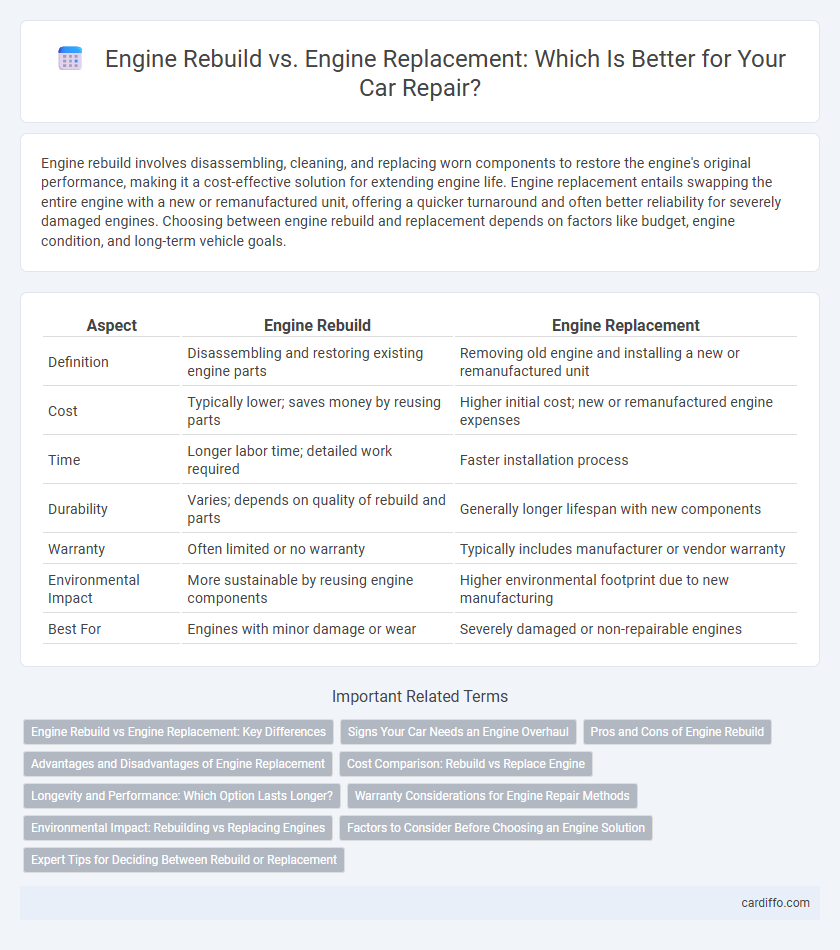Engine rebuild involves disassembling, cleaning, and replacing worn components to restore the engine's original performance, making it a cost-effective solution for extending engine life. Engine replacement entails swapping the entire engine with a new or remanufactured unit, offering a quicker turnaround and often better reliability for severely damaged engines. Choosing between engine rebuild and replacement depends on factors like budget, engine condition, and long-term vehicle goals.
Table of Comparison
| Aspect | Engine Rebuild | Engine Replacement |
|---|---|---|
| Definition | Disassembling and restoring existing engine parts | Removing old engine and installing a new or remanufactured unit |
| Cost | Typically lower; saves money by reusing parts | Higher initial cost; new or remanufactured engine expenses |
| Time | Longer labor time; detailed work required | Faster installation process |
| Durability | Varies; depends on quality of rebuild and parts | Generally longer lifespan with new components |
| Warranty | Often limited or no warranty | Typically includes manufacturer or vendor warranty |
| Environmental Impact | More sustainable by reusing engine components | Higher environmental footprint due to new manufacturing |
| Best For | Engines with minor damage or wear | Severely damaged or non-repairable engines |
Engine Rebuild vs Engine Replacement: Key Differences
Engine rebuild involves disassembling, cleaning, and replacing worn components to restore the original engine's performance, often preserving the vehicle's value. Engine replacement swaps the entire engine with a new or remanufactured unit, offering a quicker solution but potentially higher costs and compatibility considerations. Key differences include cost efficiency, time investment, labor intensity, and long-term reliability outcomes.
Signs Your Car Needs an Engine Overhaul
Frequent engine knocking, excessive oil consumption, and decreased fuel efficiency are key signs your car needs an engine overhaul rather than a full replacement. Visible smoke from the exhaust, overheating issues, and loss of power indicate internal engine wear, prompting the need for a rebuild. Identifying these symptoms early helps determine whether an engine rebuild can restore performance and extend vehicle lifespan cost-effectively.
Pros and Cons of Engine Rebuild
Engine rebuilds preserve the original engine block and components, often making them more cost-effective compared to full replacements by only addressing damaged parts. This process maintains the vehicle's factory specifications and improves fuel efficiency and performance without introducing compatibility issues. However, engine rebuilds can be time-consuming, may not guarantee the same longevity as new engines, and sometimes uncover unexpected internal damage that increases costs.
Advantages and Disadvantages of Engine Replacement
Engine replacement offers the advantage of restoring vehicle performance with a brand-new or refurbished engine, ensuring reliability and often a warranty, which reduces the risk of future breakdowns compared to extensive repairs. However, engine replacement can be significantly more expensive than a rebuild, involving higher labor costs and potential compatibility issues with the existing vehicle components. This method also may lead to longer vehicle downtime and the possibility of factory calibration adjustments required for optimal engine integration.
Cost Comparison: Rebuild vs Replace Engine
Engine rebuilds generally cost 40-70% less than full replacements, with typical rebuild expenses ranging from $2,500 to $4,000 compared to $4,000 to $7,000 for new engines. Rebuilding extends the engine's lifespan by refurbishing worn parts, offering a budget-conscious option while maintaining original vehicle components. Replacement engines often come with warranties and may provide longer durability but require higher upfront investment and potential additional costs for installation and tuning.
Longevity and Performance: Which Option Lasts Longer?
Engine rebuilds can extend the life of an existing engine by restoring worn components, often improving performance to near-original specifications with lower costs and less environmental impact. Engine replacements provide brand-new performance levels and longer warranties but involve higher expenses and potential compatibility issues with older vehicle models. Choosing between rebuild and replacement depends on the vehicle's condition, intended use, and long-term maintenance goals to maximize engine longevity and performance.
Warranty Considerations for Engine Repair Methods
Engine rebuilds often come with limited warranties that cover specific parts and labor for a defined period, typically ranging from 12 months to 36 months or 12,000 to 36,000 miles. Engine replacements usually offer more comprehensive warranties, often including full coverage on the entire engine with terms extending up to 100,000 miles or longer, depending on the manufacturer or service provider. Evaluating warranty coverage is crucial when choosing between rebuilding and replacing an engine, as it impacts long-term repair costs and vehicle reliability.
Environmental Impact: Rebuilding vs Replacing Engines
Engine rebuilding significantly reduces environmental impact by lowering the demand for new raw materials and minimizing waste compared to engine replacement. Rebuilding saves approximately 85% of the energy required for manufacturing a new engine, cutting carbon emissions and conserving resources. Choosing rebuild over replacement supports sustainable repair practices and promotes circular economy principles in automotive maintenance.
Factors to Consider Before Choosing an Engine Solution
Evaluating an engine rebuild versus engine replacement requires analyzing cost-effectiveness, long-term reliability, and vehicle condition; rebuilt engines often provide a more affordable option with retained original specifications, while replacements guarantee new components and extended warranties. Consider engine mileage, damage severity, and availability of quality parts to determine feasibility, with rebuilds suited for less severe wear and replacements preferred for catastrophic failures. Assess labor complexity and downtime, as rebuilds can demand extensive craftsmanship, whereas replacements may minimize installation time but at higher upfront expense.
Expert Tips for Deciding Between Rebuild or Replacement
Engine rebuilds preserve original components by restoring functionality, ideal for high-value or classic vehicles with limited wear. Engine replacement offers a quicker, often more reliable solution when extensive damage or outdated technology compromises performance. Expert tips emphasize assessing cost-effectiveness, vehicle age, and long-term reliability before deciding between rebuild or replacement.
engine rebuild vs engine replacement Infographic

 cardiffo.com
cardiffo.com